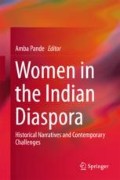Abstract
This chapter examines the gender differentials of Indian high-skilled (or knowledge workers) and low-skilled (or service workers) in the US labour market for the year 2014 in comparison to those of the Chinese, Asians, foreign-born persons and natives. The gender differentials are analysed in the context of three premia, viz. ‘age, wage and vintage’ as distinct parts of skill premium in the skill-biased technological change (SBTC). Five significant results have been derived: (i) The Indian female knowledge workers dominate in comparison to other female counterparts; (ii) The share of Indian younger females is lowest; (iii) The percentage share of Indian female to male wage; (iv) The percentage share of Indian females with a bachelor’s degree and above was 68%, which was not far below that of Indian males at 73%; and (v) The higher shares of Indian female population with higher embodied human capital did not assure their greater participation in the high-skilled segment of the labour market, as compared to their other counterpart females, due to their higher family responsibilities including looking after children, which adversely affect their participation in the US labour market and their wages. Thus, gender inequality is not only an important issue in the country of origin, like India, but also in the country of destination, like the United States. This calls for the need to establish a comprehensive linkage between gender, migration and development in the context of the agenda for Sustainable Development Goals (SDGs) as pronounced by the UN for 2016–2030.
Notes
- 1.
The high-skilled workers defined as ‘knowledge workers’ are mainly those engaged in management, business, science and arts occupations, as per the US census nomenclature. Further the ‘service workers’ are defined as non-knowledge workers and it means they work in the low-skilled occupations, namely, service, sales and office, natural resources, construction, and maintenance and production, transportation and material moving occupations (Khadria 1999).
References
ACS. 2016. American Community Survey. Washington, DC: American Community Survey, US Census Bureau.
Berman, E., J. Bound, and Z. Griliches. 1994. Changes in the Demand for the Skilled Labour Within US Manufacturing: Evidence from the Annual Survey of Manufactures. The Quarterly Journal of Economics 109 (2 May): 367–397.
Inderfurth, Karl F., and Persis Khambadda. 2012. India’s Economy: The Other Half. Center for Strategic and International Studies (CSIS) 2 (2).
Khadria, Binod. 1999. The Migration of Knowledge Workers-Second-Generation Effects of India’s Brain Drain. New Delhi: Sage Publications India Private Limited.
Khadria, Binod. 2000. Gender-Based Positive Discrimination: Is There a Case? In Women, Power and the Academy: From Rhetoric to Reality, ed. Mary-Louise Kearney. New York: UNESCO Publishing/Berghahn Books.
Khadria, Binod. 2009. Adversary Analysis and the Quest for Global Development: Optimising the Dynamic Conflict of Interest in Transnational Migration. Social Analysis 53 (3): 106–122.
Khadria, Binod. 2010. The Future of International Migration to OECD Countries Regional Note South Asia. OECD Journal 1–22.
Khadria, Binod. 2016. Gender-Based Immigration Visa? On Rationality of a Legislative Innovation. In India Migration Report 2015: Gender and Migration (Chapter 1), ed. I. Rajan. Routledge.
Khadria, B., and N. Thakur. 2016, Forthcoming. Age, Wage and Vintage: Empirical Validation of the Impact of Skill-Biased Technological Change on the Migration of Indian Knowledge Workers to the US. In International Migration, Special Issue ed. Wei Li, and B. Khadria.
Krugman, P.R. 2000. Technology, Trade and Factor Prices. Journal of International Economics 50: 51–71.
Piketty, T. 2014. Capital in the Twenty-First Century. London: The Belknap Press of Harvard University Press.
Rhodes, Francesca. 2016. IMF on Gender and Income Inequality: From Research to Implementation. London. http://www.brettonwoodsproject.org/wp-content/uploads/2016/02/At-Issue-gender-Feb16-final-BW.pdf.
Stiglitz, J. 2012. The Price of Inequality. New Delhi: Allen Lane.
Thakur, N. 2016. Globalisation of India’s Human Capital: Interlinkages Between Education, Migration and Productivity. Ph.D. diss., Jawaharlal Nehru University, New Delhi.
UN. 2015. Addis Ababa Action Agenda of the Third International Conference on Financing for Development. New York: United Nations.
WEF. (World Economic Forum). 2015. The Global Gender Gap Report, 10th Anniversary ed., Geneva, Switzerland.
Author information
Authors and Affiliations
Corresponding author
Editor information
Editors and Affiliations
Rights and permissions
Copyright information
© 2018 Springer Nature Singapore Pte Ltd.
About this chapter
Cite this chapter
Thakur, N., Khadria, B. (2018). Gender Differentials of Indian Knowledge and Service Workers in the US Labour Market: A Comparative Analysis in the Context of ‘Age, Wage, and Vintage’ Premia. In: Pande, A. (eds) Women in the Indian Diaspora. Springer, Singapore. https://doi.org/10.1007/978-981-10-5951-3_10
Download citation
DOI: https://doi.org/10.1007/978-981-10-5951-3_10
Published:
Publisher Name: Springer, Singapore
Print ISBN: 978-981-10-5950-6
Online ISBN: 978-981-10-5951-3
eBook Packages: Social SciencesSocial Sciences (R0)

